There were only two subjects in the whole universe worth knowing: thermodynamics and information theory. Blood cells in a capillary, rioters on Main Street, travelers vectoring some new arbovirus from the Amazon Preserve — life, and its side effects — all the same thing, really.
The only difference was the scale and the label - Peter Watts
Today's word is data visualization. What's that? It's basically the mapping impulse applied to non-geographical areas of space, time and understanding. You take all those dull dry numbers and turn them into an awesome pie chart!
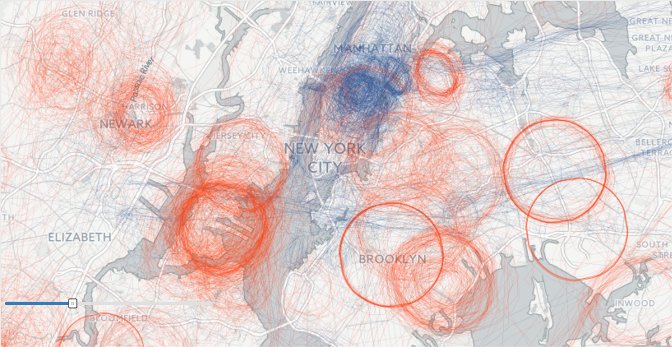
In truth, data visualization is one of the most fascinating fields for a science enthusiast. Like drone photography, it fuses science with art, small details with big picture, pattern with beautiful noise. It comes from the truth that, whatever Emily Dickinson might have thought, the brain is not wider than the sky. Everything we "know" about the world is a shrunken scaled-down abstraction of the actual thing. We don't know every detail of the drive home from work. We know landmarks and string them together, the rest is just streaming wallpaper.
Given all that, you might be taking another look at the top of this article and wondering when I'm going to get to the "maps and money part", yeah? Fair enough. If you've considered the "why" of maps and data visualizations as opposed to the "what" we glanced at above, you already know the answer. Why do we create maps and data visualizations? Because we're trying to gain an advantage over reality or over each other. These days, that advantage is almost always financial.

You see, in the world of today, the true powers are not the obvious marketing juggernauts we see on our screens and pages every day: the Coca-Colas, the Disneys. Nor is it the big huge resource extraction behemoths like Saudi Aramco or Sinopec (but we are getting closer. How many people had heard of Sinopec before reading it sixteen words ago? I only learned of its existence as I typed this paragraph)
No, the true powers are the companies you've never heard of, that you would never hear of if you weren't in the relevant industries or we weren't living in the online age of ever-more thinly split hairs. I speak of the support companies, the ones that provide eyes and ears (and mouths to whisper in those same ears) to the above-mentioned juggernauts, the economic equivalent of the so-called Deep State.
One perfect example of this is Orbital Insight. Unless you happened to have read the same articles I recently read or you're in the hedge fund business (if the latter, scroll down to the bottom of this article and feel very free to send money, you rich m&^$&@#^er), you have probably never heard of these guys. That's because they are the seers, not the seen and they see everything.
Those of us who have been growing increasingly concerned about surveillance have come to realize we've been frightened of the wrong thing. Big Brother isn't scary, it's Uncle Scrooge we should have been worried about, not the surveillance society but the surveillance economy.
NOPICTURES
Orbital Insight describes what they do as "... Understanding global and national trends through advanced image processing and data science at petabyte scale" and " ... finding truth and transparency in the ever-expanding supply of satellite images." In practice, this means they apply human and machine eyes to the vast quantity of satellite images currently available to the world and relating that data to viable actions that will profit their clients -- who in turn pay Orbital Insight a pretty penny. It's all about finding connections between data points until observation becomes a kind of perceptual magic, where profit is found by deeper and deeper insight into more and more information. Mining the present to sponsor the future.
How do they do this? The best and coolest example of what Orbital Insight does is the oil thing. They can literally look down at satellite images and see how much oil a company has extracted from the ground on a day-to-day hour-to-hour basis? How? By looking at the shadows. What shadows? They look down at oil storage tanks -- and then measure the length of the shadows cast by their lids as the amount of oil in the tank increases or decreases 😱
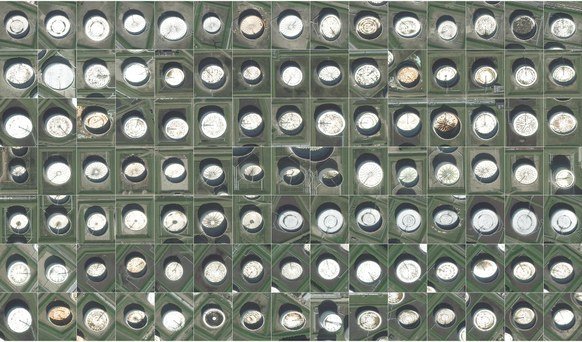
With this alone, they can throw machine algorithms at the data, multiply these ever-changing shadow lengths by the number of tanks they're looking at and spit out precisely accurate numbers on how much oil a company has or doesn't have or has sold or bought. With that, they can predict how much that company will have today or tomorrow or next week and then sell these insights to their customers (other companies trying to get a leg up on the competition or hedge fund investors looking to trade the right stocks at the right moment. Profit all around, as if by access to a particularly mercenary oracle)
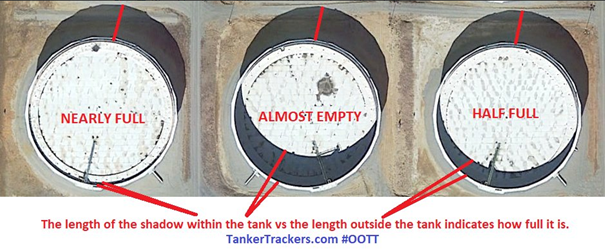
Of course, it's more than just oil. If you really think about the implications of this kind of perception of the world from above and action based on that perception from below, the mind fairly boggles. They count cars in parking lots to extrapolate how much money a mall is making (or losing) They count new roads to extrapolate how many trees are being cut down (or going to be cut down.) They count plots of farmland, extrapolate famines and from there, extrapolate the starter guns of new wars.
Consider how this affects environmental studies, human and animal migration, smart cities, riot prediction -- the list goes on. This is not me speculating, this is what these guys are doing today as you read this sentence.
Next question: just how did they do this? I mentioned machine learning and image analysis algorithms before but truth be told, that's the 'sense-maker' part of the job. What about the 'picture-taker' part? How do they get this much data this easily, with only 30-something employees?
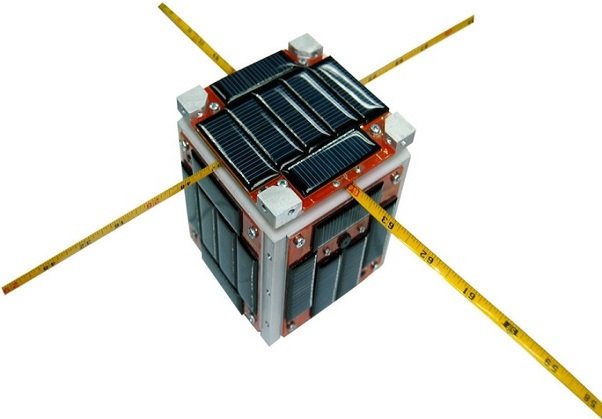
Turns out, it was the open-source-ization and democratization of information access that has blown the world wide-open for anyone paying attention. Cubesat was a big one, allowing colleges and even high schools to create tiny yet powerful satellites and throw them into orbit -- and then making all the pics and video they gather available to whoever wants it. A whole lot of other companies have gotten into that too.
Of course, none of this happens in a vacuum. Money casts a long shadow. The more they know the more they want to know; the tech becomes a runaway train of ever broader surveillance, ever deeper interpretation of the data gathered.
I've said before that money is really mostly a means of allocating attention. When something worth paying attention to shows up, the money will inevitably go there and the vast cool unsympathetic eye of Uncle Scrooge follows. See enough trees and you get the forest, ripples on the water tell you how many fish, you know you're awesome when you've got both Google and NASA on your CV. Welcome to 21st-century natural selection, not survival of the fittest but survival of the better informed.
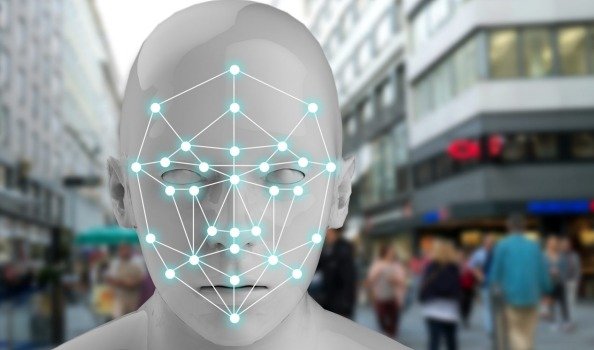
“We’re not marketers,” says Zatreanu. “We want to understand not just you but what people like you are doing.”
All this comes down to prediction, the desire to make the world knowable and controllable. To accomplish that at this level? You don't need individuals but demographics; you don't need humans, you need lines on a graph; you don't need people, you need trends; so you can better give your customers the world -- at scale.
I find myself more and more terrified by the true nature of the world with every passing day.
References
How satellites, drones and planes are making hedge funds money - the article that inspired this whole thing. It's amazing, go read it, seriously.
https://orbitalinsight.com/#slider-1 - The Orbital Insight website because you of course have to go to the source
https://www.fastcompany.com/3067492/why-orbital-insight-is-one-of-the-most-innovative-companies-of-201 - Why Orbital Insight is one of the Most Innovative Companies of 2017
https://www.fastcompany.com/40425808/how-tiny-satellites-are-changing-the-way-we-do-business - How Tiny Satellites are Changing the Way We Do Business
https://flowingdata.com/2016/12/29/best-data-visualization-projects-of-2016/ - Best Data Visualization Projects of 2016
https://www.wired.com/story/how-ai-could-really-enhance-images-from-space/ - How AI Could Really Enhance Images From Space

If you like what you read, far be it from me to stop you from tipping/donating like so (in order of preference):
👇
Steem/SBD: @edumurphy
Dash: XdCpkRRxejck5tfXumUQKSVeWK8KwJ7YQn
ETH: 0x09fd9fb88f9e524fbc95c12bb612a934f3a37ada
NKN: NaAKsxh3SycrXNkbJMxYsvfwWbDteBga8w
Doge: DCbNkisABpx4ngYEqypQaTypzm7rfGwDeL
BTC (if you must): 1L9foNHqbAbFvmBzfKc5Ut7tBGTqWHgrbi


Wow, this is the most interesting post I've read in a while.
And yes I agree with you, in this digital age data visualization is worth a lot of attention.
The ability to view and understand data is the heart if science.
Nice post
Great post and I agree! The continued rapid increase in data has made visualization so important. In this case, the direct look at the amount of oil being extracted on a day to day basis. I would also argue that the rapid increase in data necessitates strength in statistics/financial mathematics as this company needs to take observed data and translate it into tradeable signals. Basically, the world is your oyster if you have a strong foundations in data visualization and statistics ha.
That's exactly right and exactly what such companies are doing - turning it into tradeable signals. That's why hedge fund managers and bigger companies pay them the big bucks. Statistics and financial mathematics with the added magic of automation to make it happen faster and more reliably and more repeatably. You are correct 👍
This is an area of big represenation in science. And moreso researches are never completed without it. Well articulated article.
Agreed. It's one of the yin-yang interface points where art overlaps with science -- or in the case of data visualizations, where art is emergent from science. Pleasing to the eye yet informative to the brain, win-win-win till the end of forever :D
Check out my 'econophysics' blog post. Great job! I love people who add their research into their thoughts. <3
Thanks for being my first upvote! 👍
reads your econophysics post
BROTHER!!!! 😀
Okay, you got my money. This is definitely one of the best posts I have read today! I have no special comment to make, but I really enjoyed reading your text, and I wanted to let you know :)
Whoa! My appreciation knows no bounds; I had no idea I would check my page and see this ... madness!!! OMGWTFBBQ
... ahem. So yeah, I am quite pleased at the response and thanks so much for your generous upvote and comment.
We are there to help ;)
[in case you didn't notice :p]
Man, this is some good writing! I wasn't bored for a moment, and the subject is interesting. It's the stuff you read from the pros online, although in their case the humor would probably be toned down to appear more serious.
You got a new follower in me!
Looking forward to more.
(I found this from the steemSTEM digest.)
Your interest and compliments are much MUCH appreciated. Feel free to check out the Assassin Bug post a little further up as well :D
(Sooooo ... where is this SteemSTEM digest to be found?)
I mean the "distilled" digest, surely you know about it. Or maybe you missed the latest issue.
Got it. Very flattered to be mentioned there.
Orbital Insight has a cool tagline and a terrifying'y Big-Brother-esque product, but let's take a candid look at their performance. They've been around for 5 years, raised ~80 Million in seed funding, going back for another round according to Crunchbase. To put that in context, that's less than 2% of what Snapchat raised. Not a lot of money when your business model requires regular ultra-hi-res photos taken from satellites. They've received next to no attention outside of futurist articles and fanboying. The idea is cool, like really f*cking cool, but their personal brand of satellite imagery + ML has a long way to go before becoming a major market player.
Valid point. I was keeping the article short and focused -- otherwise I'd never have finished -- so I didn't go into just how many companies and startups do pretty much the same thing Orbital Insight does. It's not one company, it's an entire surveillance economy ecosystem providing this connective tissue to the highest bidder(s)
Heck, there's even this which is available to you and I freely (and isn't that pretty crazy in and of itself?) They, in turn, get their data from Planet who appear to do ... pretty much what Orbital Insight does lol
Also, Snapchat is a messaging program and hilariously overvalued, especially compared to a much cooler and more potent service like geospatial big data. A great many of the best minds in the world are building apps when they could be building the real future.
Well researched work man. You really spent time in doing this. Well done.
I have many many unfinished posts sitting on my laptop. Each time, I sit down, I progress more and more on a few at a time until one (like this one) finally finishes. Aluta continua etcetera
Yeah, aluta continua. Your writing speaks volumes if your beautiful mind. No pictures needed.
You sure can write and you got a lot to say. You give me this feeling: "Even without the research, I got this"
I stand amazed. Do more.
Research is the easy part, man. It's turning that research into something formatted so that other people will like it too that drives me up the wall and takes months for me stupid stupid brain!
I understand what you mean. But I don't think that it is the Stupidity of the brain that is responsible for your difficulty. Instead, I suspect that the frequency of the brain is a bit ultra for us so it must take loads of work to water down your thoughts to enable mere mortals comprehend it
Thanks for this insightful post (resteemed!), it's really fascinating what these companies can do. Though I think once this becomes common, the companies who are spied on will simply "close their lids", so to say.
A really interesting application for these technologies would be analyzing nature, like oceans, forests, glaciers, or even space. There may be so many things in the big picture which we were not able to see yet!
Thanks so much for the resteem.
In my research, I was lead to understand that they're doing this already. Glaciers, deforestation, all that. What's really interesting about it for me is the predictive aspect. If you see soil losing fertility and rivers drying up, you can predict a war before it happens. See enough roads being built in a certain direction and you can predict deforestation. Get big enough data about the past and the present, put the right algorithms on it and the future becomes a golden thread that you can follow.
It's almost like in Asimov's Foundation series. :)
Getting there. Turns out humans aren't as unpredictable as we like to think. Throw enough data at the problem and who knows? ¯_(ツ)_/¯
And kudos for the Asimov reference :D scifi fans are surprisingly thin on the ground on Steemit.
A lot of this is very complex but I can relate to parts of it. When I map out a route to go cycling in a new area, I use Strava's 'heatmaps' or search the area to find popular 'segments' - sections of road that people mark out to compete against others. This way, I set out knowing my route is a tried and tested one and I won't find myself confronted with a freeway or other dangerous section of road to turn onto. Thanks for your knowledge share. I will mark this one for closer reading and re-reading.
Yep, the concepts can be applied to damn near anything at damn near any perceptual scale, whether the individual like yourself or a giant oil company or a government. We are the data and the data is us.
Geologists have started using some of these techniques, as have ecologists and some other types of Earth scientists- but our resources tend to be much less vast than corporate resources.
😱😱😱😱😱😱😱😱
:)
Lol i guess u r happy that u r higher rep than me again. Excellent post, of course, albeit creepy. Less "fun" but i guess fun doesnt pay these bills lol. Get rich on crypto but dont forget about lil ole me * pouty face*
Really? I thought it was pretty fun myself. It only gets terrifying when you extrapolate the technology further into the future.
Forget about you? Hahahahaa, perish the thought :D
Lol yeah the sciency ppl like all your hard work but i prefer stories and tandom silly rants i guess? I'm weird. But obvi i dont got money like that sooo dont listen to me hehe. It was funny for being a dark and technical subject.
Great article @edumurphy as you unravelled some hidden truth from the majority.
Nothing is hidden anymore, just drowned in too much of the majority. All the truths are crowded together along with the falsehoods.
Amazing post I like that